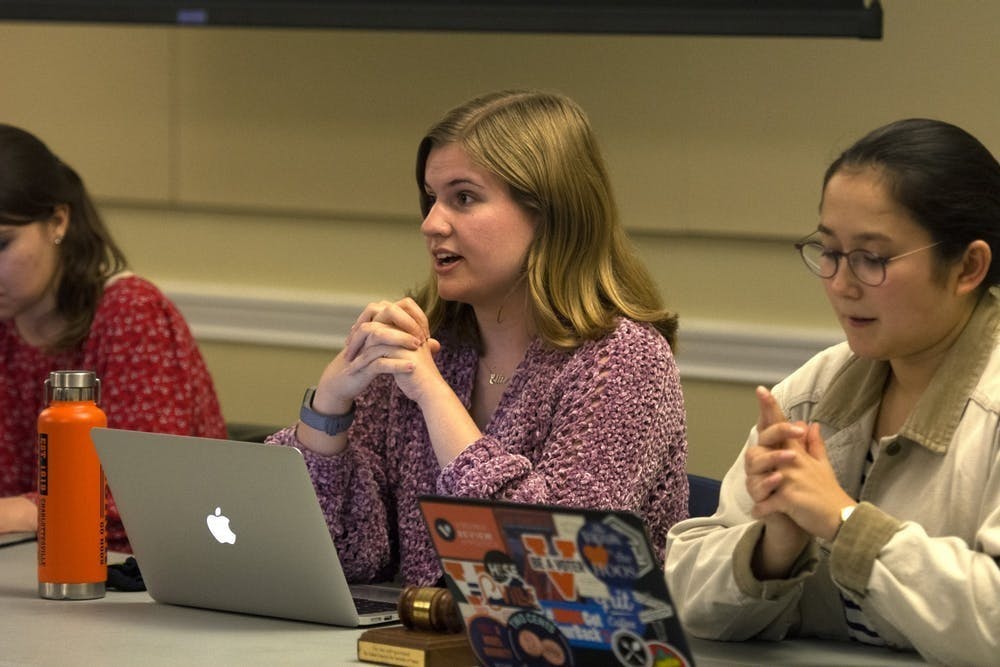Ellie Brasacchio, fourth-year College student and Student Council president, proposed a bill at the latest Student Council meeting Tuesday night that would integrate the University’s Community Food Pantry with Student Council. Other initiatives, such as providing free menstrual hygiene products on Grounds and an event to redistribute iClickers, were also discussed at the meeting.
The U.Va. Community Food Pantry is a student-run food pantry open to both students and staff, with the goal of eliminating financial hardships University community members may face in accessing food. It was created by Student Council’s representative body and launched in October 2018. Since then, the food pantry’s only connection to Student Council has been through the president’s responsibility to appoint the executive director of the food pantry.
In response to the food pantry’s recent expansion and changes, Brasacchio and Mairin Shea, executive director of the Community Food Pantry and fourth-year Batten student, decided that integrating the food pantry into Student Council would be the best course of action.
“This bylaw bill basically enshrines all the current positions of the pantry executive board and what they do,” Brasacchio said. “Currently, none of the members of the pantry council are members of Student Council, and now they will be.”
The University Community Food Pantry moved from Runk Hall to a more central location in the Student Activities Center on the first floor of Newcomb Hall Wednesday. The food pantry will be open during the Student Activities Center’s hours.
“A central location and the better hours means that more students can hopefully take advantage of the pantry, so it's really a big deal to us, and we are hoping that more students will be able to utilize the pantry because of this change,” Brasacchio said.
The food pantry has also upgraded its utilities and appliances, allowing a wider range of food to be served.
“We now have a fridge and a freezer, so we can offer perishable food items instead of just canned and boxed goods, which is really great for the variety of our products and the variety of food that we can offer to students,” Brasacchio said. “This is very, very exciting. The food pantry is two years in the making, so it just goes to show how much students can do on a long-term project like this.”
Because this bill proposes to amend the existing bylaw, it must be read twice according to Student Council regulations — therefore the bill was tabled last night and will be read again and voted on next Tuesday during the General Body meeting.
Brasacchio also discussed the initiative to provide free menstrual hygiene products in various bathrooms on Grounds, which initially launched in spring 2018. The pilot program began on $600 in Student Council funds and was later supported by partnering with the Inter Sorority Council.
“I had a meeting with Cheryl Gomez last week, who is the director of operations and facilities management, and she gave me a lot of really great statistics on our pilot program that we've been doing in Newcomb, 1515 and now Gibson Hall, showing that students are actually using these products,” Brasacchio said.
Brasacchio said she also plans to meet with Dean of Students Allen Groves next week to figure out where the funding will come from long term and how to move the free menstrual hygiene program forward.
Megha Karthikeyan, fourth-year Commerce student and Student Council’s Chief of Cabinet, said they are working with trustees to begin an iClicker redistribution event that aims to provide a way for iClickers to be reused and redistributed among younger students at the University. An iClicker remote generally costs between $42 to $56 at the University bookstore, depending on the model.
“The idea is that a lot of people buy iClickers their first-year and use them maybe once or twice, and then end up not using it,” Karthikeyan said. “Then when they graduate, they either throw it out or try to sell it for what they can. So we're trying to basically redistribute them to people who maybe aren’t able to afford to buy brand new ones.”
The Council plans to further discuss logistics for this event during future general body meetings.
Correction: This article previously misstated that Mairin Shea is a fourth-year College student. Shea is a fourth-year Batten student, and the article has been updated with the correct information.







